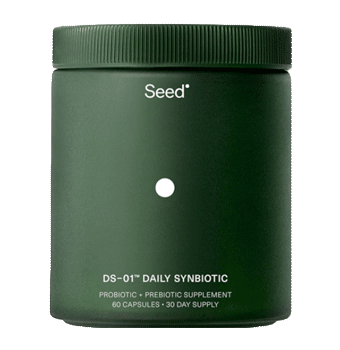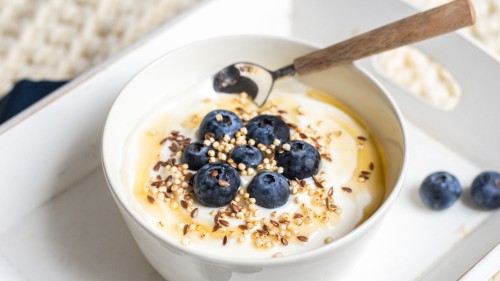WellnessVerge is reader-supported. We may earn a commission when you make a purchase through the links on this page. Learn more about our process here.
10 Evidence-Based Ways to Improve Your Gut Health
Last Updated on July 25, 2022
Medically Reviewed by Anthony Dugarte, MD
Good digestion is the foundation of good health. If you are looking to improve your gut health, there are many evidence-based steps you can take.


Overall health begins with a smoothly running digestive system.
You can greatly impact how well your gut works by choosing foods that support digestion and a healthy microbiome, with actions like chewing and physical activity and avoiding things that may harm your digestive system.
Practicing these evidence-based habits as part of a lifelong dietary pattern increases the chances of a healthier life. (1)
1. Chew Your Food Well
In today’s busy world, we often rush through meals without taking the time to chew properly.
The benefits of chewing go beyond avoiding indigestion. Proper chewing:
- Allows salivary enzymes to mix with food, the first chemical process of digestion.
- Breaks down food and moistens it, decreasing stress on the esophagus.
- Decreases gas-related problems during digestion, including belching. (2)
- Signals the pancreas to release enzymes and the stomach to make gastric juices.
- Increases the surface area of food so that the rest of the digestive system extracts nutrients more efficiently and possibly increases the value of what you’ve eaten.
Adequate chewing should not necessarily be measured by a certain number of chews.
Instead, notice whether your food has lost its texture and is well softened as it mixes with saliva. This could be 10 chews for a cooked carrot or 40 chews for a piece of jerky.
Also, adequate chewing results in satiety before you become uncomfortably full, which can help maintain a healthy weight. (3)
The hormone leptin is released as the stomach fills, and the feeling of fullness is recognized before you gulp down too many bites.
2. Reduce Stress Levels
If you’ve ever been in a stressful situation after eating a large meal, you may have experienced stomach discomfort.
This is actually a very normal response to the hormones that are released in times of stress.
Your nervous system prioritizes energy for a possible need to fight or flee, resulting in slowed digestion.
Scientists are just beginning to study this “gut-brain axis” or the connection between the central and enteric nervous systems.
Evidence shows that people with chronic stress or anxiety experience digestive problems more often. (4)
If stress seems to affect your digestion, behavioral therapies led by licensed practitioners have been shown to help, including: (5)
- Cognitive-behavioral therapy to explore coping skills.
- Relaxation therapy including deep breathing, listening to music, and progressive muscle relaxation.
- Hypnotherapy focused on gastrointestinal function.
Some evidence is also showing that having a healthy microbiome is important for both mental health and digestive health.
3. Eat a Wide Variety of Prebiotic, Plant-Based Foods
Plants, including fruits, vegetables, pulses, and whole grains, provide the abundance of micronutrients needed to maintain a healthy digestive system. They also contain prebiotics that are essential to the health of the gut microbiome.
Prebiotics are the components in foods that feed the beneficial bacteria, often referred to as the gut microbiome, that live in our large intestine.
We are just beginning to uncover how important the symbiotic relationship is between humans and these microbes.
They need us to provide food so they can flourish. In turn, they help keep our digestive systems running smoothly.
Some key foods have been solidly identified as prebiotic foods. These foods contain a special type of carbohydrate called microbial accessible carbohydrates (MACs) that we cannot digest but that our gut flora needs for fuel.
Each of these flora-healthy food feeds different strains of good bacteria:
- Vegetables: Onions, garlic, leeks, Jerusalem artichokes, globe artichokes, asparagus, chicory root, burdock, jicama, dandelion greens, salsify, mushrooms
- Fruit: Apples, bananas
- Pulses: Legumes, beans, chickpeas
- Whole Grains: Whole wheat, barley, rye
- Breastmilk: For babies, the prebiotic oligosaccharides in breastmilk are essential for feeding a healthy gut microbiome right from the start
While the foods above have been researched and proven to help the gut microbiome thrive, we will likely uncover many more in the future.
Keeping this in mind, eating a wide variety of plant-based foods will keep these microorganisms well fed.
4. Get Plenty of Fiber
Need another reason to eat more plant foods? Fiber, a carbohydrate, is found in plants and is made up of molecules like cellulose.
Classified into the two categories of soluble and insoluble, fiber can’t be digested by humans or intestinal bacteria. Yet fiber serves important purposes during digestion.
Soluble fiber, found in oats, apples, beans, and barley, combines with water to form a gel-like substance. Soluble fiber can aid in lowering cholesterol and blood sugar.
Insoluble fiber adds bulk to the stool, reducing the chances of constipation. It can be found in whole wheat, beans, nuts, fruits, and vegetables.
Men need about 38 grams of fiber daily for a healthy digestive system, and women need about 25 grams.
5. Eat Probiotics
While many Americans may consider some of the following fermented foods exotic, they have been recognized for their digestive benefits by other cultures for centuries.
These foods can help keep your gut flora well populated. Thanks to the recent recognition of probiotic benefits, many of these foods are now commonly found in grocery stores.
Foods that contain probiotics will list the live and active cultures on their food labels. Some of the best foods for gut health include:
- Kimchi (fermented cabbage)
- Kefir (fermented milk)
- Kombucha (fermented tea)
- Yogurt with active and live cultures
- Unpasteurized sauerkraut, found in the refrigerated section
- Tempeh (fermented soybeans)
- Miso (Japanese fermented soybeans)
- Pickles fermented in saltwater, found in the refrigerated section
Let’s not forget our precious babies. The diversity of the gut microbiome can be greatly affected for a lifetime by a newborn infant’s exposure to bacteria during the birthing process and introduction to breastmilk. (6, 7)
While cesarean delivery and formula feeding cannot always be avoided, research shows that vaginal delivery and exclusive breastfeeding are very beneficial to lifelong gut health. (8)
In some cases, probiotic supplementation may be recommended. For example, the use of antibiotics can greatly decrease the bacteria in your microbiome. (9)
Always check with your doctor to see if supplementation is appropriate for you.
6. Get Routine Sleep
In 2017 the Nobel Prize for Medicine was awarded to Hall, Rosbash, and Young for their discovery of the mechanisms that control the circadian rhythm. (10)
Their work has inspired a cascade of studies, including how sleep disturbances may lead to microbiome alterations.
This study indicated that altered sleep patterns such as what happens as a result of shift work, jet lag, and delaying bedtime affect the microbiome population, resulting in a higher risk of disease. (11)
Other studies show that a healthier microbiome can result in healthier sleep patterns. (12)
Studies like these further increase the evidence of how important regular sleep patterns are for overall health, including the digestive system.
7. Eat Foods That Aid Protein Digestion
Protein is an essential macronutrient needed to make every cell in the body.
Many of the proteins we consume are very large molecules that take a long time for the digestive system to break down into the amino acids we can use.
Eating foods high in protease enzymes with a protein-rich meal may result in improved and more complete digestion of the food.
Kiwifruit, mangos, bananas, and pineapple contain the protease actinidin, which has been shown to aid the digestion of foods, including dairy, meat, eggs, and fish. (13)
Mangos, bananas, and pineapple also contain actinidin. In addition, pineapple also has the enzyme bromelain, and papaya contains papain, both of which may also have benefits in protein digestion.
This is a case in which fresh is best because the heating process of canned fruit will break down the enzymes, making them inactive.
To give protein breakdown a boost, try starting your meal with a fresh fruit salad.
8. Drink Enough Fluids
Dehydration is one of the most common causes of constipation. (14)
When food enters the colon, water is absorbed into the rest of the body as the stool is pushed along toward the rectum.
If the body is well hydrated, what is not needed by the body is reabsorbed into the stool—dehydration results in dry, compact stools, which are difficult to pass.
The volume of fluids needed daily varies greatly, but the Dietary Reference Intakes recommend about 15.5 cups for men and 11.5 cups for women. (15)
These numbers represent all liquids consumed, including milk, tea, coffee, and juicy foods like fruits, vegetables, and soups.
9. Get Regular Exercise
In several studies, exercise has shown positive results as a treatment for gastrointestinal problems, including irritable bowel syndrome and constipation. (16, 17)
Exercise is thought to aid digestion in many ways. Some results can be immediate, and others are noticed over time.
For example, exercise immediately increases blood circulation throughout the body, including the muscles in the intestinal walls that move food along.
Entire yoga sessions have been dedicated to poses that aid digestion by increasing blood flow and massaging the abdominal area.
Strong abdominal muscles play a great role in the process of elimination. So building a strong core is helpful in the long run.
Exercise has also been shown to reduce stress, increasing microbiome health.
10. Avoid Microbiome Toxins
Another way to keep the gut microbiome healthy is to avoid substances that are known toxins to the microbiome population.
For example, cigarette smoking appears to have a significant impact on microbiome health. In this study, smoking cessation seemed to have almost as big an impact on gut microbiome health as never smoking. (18)
Sugar alternatives have been shown to alter the population of gut bacteria.
In this review, saccharine, sucralose, stevia, lactitol, and xylitol showed the potential to negatively change gut flora, bringing to question whether the benefits of using these alternative sweeteners outweigh the risks. (19)
While the safe level of alcohol use for the gut microbiome is not yet defined, heavy alcohol use has been associated with altered gut microbiota in animal and human studies. (20)
Also, several studies have shown that microbiome alterations were also associated with diseases such as small intestinal bacterial overgrowth (SIBO) and cirrhosis of the liver. (21)
Moderate alcohol use is defined as less than one drink per day for women or 2 drinks per day for men by the National Institute of Alcohol Abuse and Alcoholism. (22)
The Bottom Line
From physical actions like chewing and exercising to feeding your gut microbiome and avoiding damaging toxins, these 10 habits have been shown to improve the health of your entire digestive system.
If you have digestive concerns, a great place to begin is by speaking with your doctor.
But diet can help too. By implementing these habits into your dietary pattern, you’ll have a greater chance of maintaining gut health that is so important for a healthy body.
It’s a great investment in your quality of life for years to come.
At WellnessVerge, we only use reputable sources, including peer-reviewed medical journals and well-respected academic institutions.
- Keeping Your Gut in Check. Healthy Options to Stay on Tract.:
https://newsinhealth.nih.gov/2017/05/keeping-your-gut-check - Gas and Bloating—Controlling Emissions. A Case-Based Review for the Primary Care Provider.:
https://www.mayoclinicproceedings.org/article/S0025-6196(16)30127-6/fulltext - Effects of chewing on appetite, food intake and gut hormones: A systematic review and meta-analysis:
https://pubmed.ncbi.nlm.nih.gov/26188140/ - Stress and the gut: pathophysiology, clinical consequences, diagnostic approach and treatment options:
https://pubmed.ncbi.nlm.nih.gov/22314561/ - Stress and the sensitive gut:
https://www.health.harvard.edu/newsletter_article/stress-and-the-sensitive-gut - The Maternal Infant Microbiome: Considerations for Labor and Birth:
https://www.ncbi.nlm.nih.gov/pmc/articles/PMC5648605/ - Shaping the Gut Microbiota by Breastfeeding: The Gateway to Allergy Prevention?:
https://www.ncbi.nlm.nih.gov/pmc/articles/PMC6400986/ - Meta-analysis of effects of exclusive breastfeeding on infant gut microbiota across populations:
https://www.ncbi.nlm.nih.gov/pmc/articles/PMC6177445/ - Facing a new challenge: the adverse effects of antibiotics on gut microbiota and host immunity:
https://www.ncbi.nlm.nih.gov/pmc/articles/PMC6511407/ - Discoveries of Molecular Mechanisms Controlling the Circadian Rhythm:
https://www.nobelprize.org/prizes/medicine/2017/advanced-information/ - Acute Sleep-Wake Cycle Shift Results in Community Alteration of Human Gut Microbiome:
https://pubmed.ncbi.nlm.nih.gov/32051239/ - The Role of Microbiome in Insomnia, Circadian Disturbance and Depression:
https://www.ncbi.nlm.nih.gov/pmc/articles/PMC6290721/ - Influence of kiwifruit on protein digestion:
https://pubmed.ncbi.nlm.nih.gov/23394986/ - Association of low dietary intake of fiber and liquids with constipation: evidence from the National Health and Nutrition Examination Survey:
https://pubmed.ncbi.nlm.nih.gov/23567352/ - Dietary Reference Intakes for Water, Potassium, Sodium, Chloride, and Sulfate:
https://www.nationalacademies.org/our-work/dietary-reference-intakes-for-electrolytes-and-water - Exercise therapy of patients with irritable bowel syndrome: A systematic review of randomized controlled trials:
https://pubmed.ncbi.nlm.nih.gov/30232834/ - Exercise therapy in patients with constipation: a systematic review and meta-analysis of randomized controlled trials:
https://pubmed.ncbi.nlm.nih.gov/30843436/ - Association between Cigarette Smoking Status and Composition of Gut Microbiota: Population-Based Cross-Sectional Study:
https://www.ncbi.nlm.nih.gov/pmc/articles/PMC6162563/ - Effects of Sweeteners on the Gut Microbiota: A Review of Experimental Studies and Clinical Trials:
https://www.ncbi.nlm.nih.gov/pmc/articles/PMC6363527/ - Colonic microbiome is altered in alcoholism:
https://www.ncbi.nlm.nih.gov/pmc/articles/PMC3362077/ - The Gastrointestinal Microbiome:
https://www.ncbi.nlm.nih.gov/pmc/articles/PMC4590619/ - Drinking Levels Defined:
https://www.niaaa.nih.gov/alcohol-health/overview-alcohol-consumption/moderate-binge-drinking







